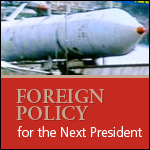Efforts to re-invigorate a movement to abolish nuclear weapons are rising on the international agenda, made clear in statements by the U.S. presidential candidates, British and Indian leaders, and a campaign led by former U.S. officials. For states without weapons, talk of nuclear disarmament is embraced as a welcome change, but viewed with skepticism. The next U.S. president should emphasize the goal of a world without nuclear weapons, explains George Perkovich in a new report.
- Strengthening verification and enforcement mechanisms, which augment U.S. and global security at a time when nuclear industry is rapidly expanding.
- Gaining the support of non–nuclear-weapon states for strengthened nonproliferation rules, inspections, and controls over fissile material through commitment to the elimination of nuclear arsenals.
- Accounting for and controlling the nuclear materials necessary to enable disarmament, greatly reducing risks that terrorists could acquire these materials.
- Wider understanding that nuclear deterrence is not a fail-safe; the long-term answer to proliferation concerns is to reduce the number and salience of nuclear weapons to zero.
About the Author
George Perkovich is vice president for studies–global security and economic development and director of the Nonproliferation Program at the Carnegie Endowment for International Peace. His personal research has focused on nuclear strategy and nonproliferation, with a focus on South Asia and Iran, and on the problem of justice in the international political economy.







